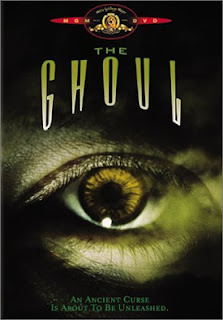Wednesday, October 31, 2012
Monsterthon 2012: The Ghoul (1933)
The first big horror movie wave of the 1930s really changed things. Through the silent era, full-blown supernatural horror was rare; it was more common to gather characters in an old dark house and have them killed off by someone masquerading as a supernatural being. Dracula and Frankenstein let actual monsters loose, but didn't wipe out the old way completely, and the UK production The Ghoul is halfway between subgenres. It's mostly built like a mystery thriller, but adds what seems to be a legitimate monster to the mix, and plays differently as a result. Despite a slightly confused approach it's an effective picture with some standout moments, elevated mostly by Boris Karloff's grim presence.
Karloff plays Prof. Henry Moriant, a dying man in possession of a rare Egyptian jewel- he believes that the jewel, placed in the hands of a statue of Anubis at the right moment, will open for him the gates of paradise. Before dying he warns of dire consequences for anyone trying to steal the gem, so naturally it gets stolen. Two of Morlant's heirs (Anthony Bushell and Dorothy Hyson) have gathered at his house, as well as her housemaid (Kathleen Harrison) and an Egyptian associate (Harold Huth), as well as a vicar who wasn't able to read the old man his last rites (Ralph Richardson in his first screen appearance.) One of them is the thief, and true to his word, the professor rises from the grave, a strong, menacing brute bent on recovering his key to eternal life.
The film doesn't lean too heavily on the mystery element; in the end, it's not quite so important who has the jewel as what everyone is going to do about the lumbering monster stalking the house. It's not really tightly structured, but it doesn't drag either. We get quite a few twists and turns, enough to justify the buildup at least, and enough that the mystery elements don't feel like a waste of time.
Karloff as the titular ghoul is still the main attraction, though. The character is no Frankenstein monster- he lacks the tragic conflict- but his makeup is effective and his physical acting is excellent. Morlant is confused, angry, but capable of discretion, as in a strange comic interlude with the silly maid. The script has one line that attempts to explain away Morlant's reanimation by saying he was buried alive (possibly a nod to British censors), but it doesn't quite make sense, since a normal not-yet-dead old man would probably not be able to bend iron bars with his bare hands.
The direction is heavy on atmosphere, and the visuals are dark- possibly almost too dark, though I wonder if that's the transfer talking. The obligatory comic relief, which really went broad in thirties horror, manages to work- Harrison's maid becomes amusingly enamored of the Egyptian gentleman, imposing all sorts of Valentino-inspired fantasies on him which he graciously indulges. There's also some bickering between our male and female leads, who are heirs but from different families in some arrangement that I can't quite recall but lets the movie dangle the possibility of romance without spending much time on it.
The point is, a lot goes on, but in the end it comes down to Boris Karloff lurking in shadows and lurching forward to strangle people, and everything else is just pretext to make it work. It's fitting that the British would get some mileage out of a home-grown horror great who was making money in Hollywood, and if Gaumont never became as big in the horror game as Universal, they at least proved they could hold their own.
Based on the play by Leonard J. Hines and Dr. Frank King
Adapted by Rupert Downing
Screenplay by Roland Pertwee and John Hastings Turner
Directed by T. Hayes Hunter
Grade: B
Labels:
Monsterthon,
Movies
Subscribe to:
Post Comments (Atom)

No comments:
Post a Comment